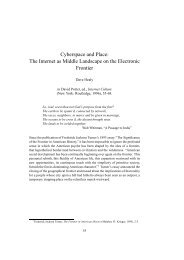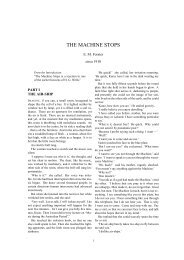PDF - The Metaphysics of Virtual Reality - University of Exeter
PDF - The Metaphysics of Virtual Reality - University of Exeter
PDF - The Metaphysics of Virtual Reality - University of Exeter
Create successful ePaper yourself
Turn your PDF publications into a flip-book with our unique Google optimized e-Paper software.
and thinking. At our fingertips is the calculating machine dreamed <strong>of</strong> by Pascal and<br />
Leibniz, the fathers <strong>of</strong> modern metaphysics, but now this calculator operates on our<br />
language as we spontaneously produce it.<br />
Heidegger sensed that the language machine belongs to our destiny. What did<br />
he mean when he said the language machine would "take language into its management<br />
and master the essence <strong>of</strong> the human being"? Was he simply reacting to change?<br />
Should we place him historically among the reactionaries <strong>of</strong> his time? 13 I think not.<br />
Political terms <strong>of</strong> reaction or progress are too crude here. Heidegger’s statement invites<br />
us to insight, not political agendas. He was meditating on a technology still in the<br />
bud. Now that this technology is blossoming, we need to consider what he was getting<br />
at. Neither Luddite nor technophobe, Heidegger resisted every attempt to categorize<br />
his views as either optimistic or pessimistic. Whether the glass was half-empty or<br />
half-full, Heidegger was interested in the substance <strong>of</strong> its contents. He was a s<strong>of</strong>t determinist,<br />
accepting destiny while studying the different ways <strong>of</strong> absorbing its impact.<br />
In this respect, he resembled the Canadian philosopher <strong>of</strong> communication Marshall<br />
McLuhan.<br />
McLuhan and Computers<br />
Like McLuhan, Heidegger believed that he had grasped something unique and essential<br />
about the twentieth century. Both Heidegger and McLuhan felt an inner relationship<br />
to their epoch. Each believed that he was interpreting a destiny that the<br />
next generation would receive, and each believed that the legacy <strong>of</strong> his reflections on<br />
technology was far more important than his own personal value judgments about technology.<br />
McLuhan wrote that he held back his own value judgments from the public<br />
because they create "a smog in our culture." He wrote: "I have tried to avoid making<br />
personal value judgments about these processes [<strong>of</strong> technological transformation]<br />
since they seem far too important and too large in scope to deserve a merely private<br />
opinion." 14 Similarly, Heidegger held back statements <strong>of</strong> personal values from his philosophy,<br />
whether statements <strong>of</strong> self-justifications or <strong>of</strong> a moral agenda.<br />
13 A recent study that locates Heidegger’s theory <strong>of</strong> technology in the cultural reaction <strong>of</strong> the Weimar<br />
Republic is Michael Zimmerman, Heidegger’s Confrontation with Modernity: Technology, Politics, Art<br />
(Bloomington: Indiana <strong>University</strong> Press, 1990).<br />
14 Marshall McLuhan to Jonathan Miller, April 1970, in <strong>The</strong> Letters <strong>of</strong> Marshall McLuhan, comp. and<br />
ed. Matie Molinaro, Corinne McLuhan, and William Toye (New York: Oxford <strong>University</strong> Press, 1987),<br />
p.405. In a letter to Jonathan Miller, April 1970, McLuhan wrote: "I take it that you understand that I<br />
have never expressed any preferences or values since <strong>The</strong> Mechanical Bride. Value judgments create<br />
smog in our culture and distract attention from processes. My personal bias is entirely pro-print and all<br />
<strong>of</strong> its effects" (ibid.). In other places, McLuhan was not so open about his stance. In writing to Eric<br />
Havelock, May 1970, for instance, he noted:<br />
My own studies <strong>of</strong> the effects <strong>of</strong> technology on human psyche and society have inclined<br />
people to regard me as the enemy <strong>of</strong> the things I describe. I feel a bit like the man who<br />
turns in a fire alarm only to be charged with arson. I have tried to avoid making personal<br />
value judgments about these processes since they seem far too important and too large in<br />
scope to deserve a merely private opinion (ibid., p.406)<br />
65
















